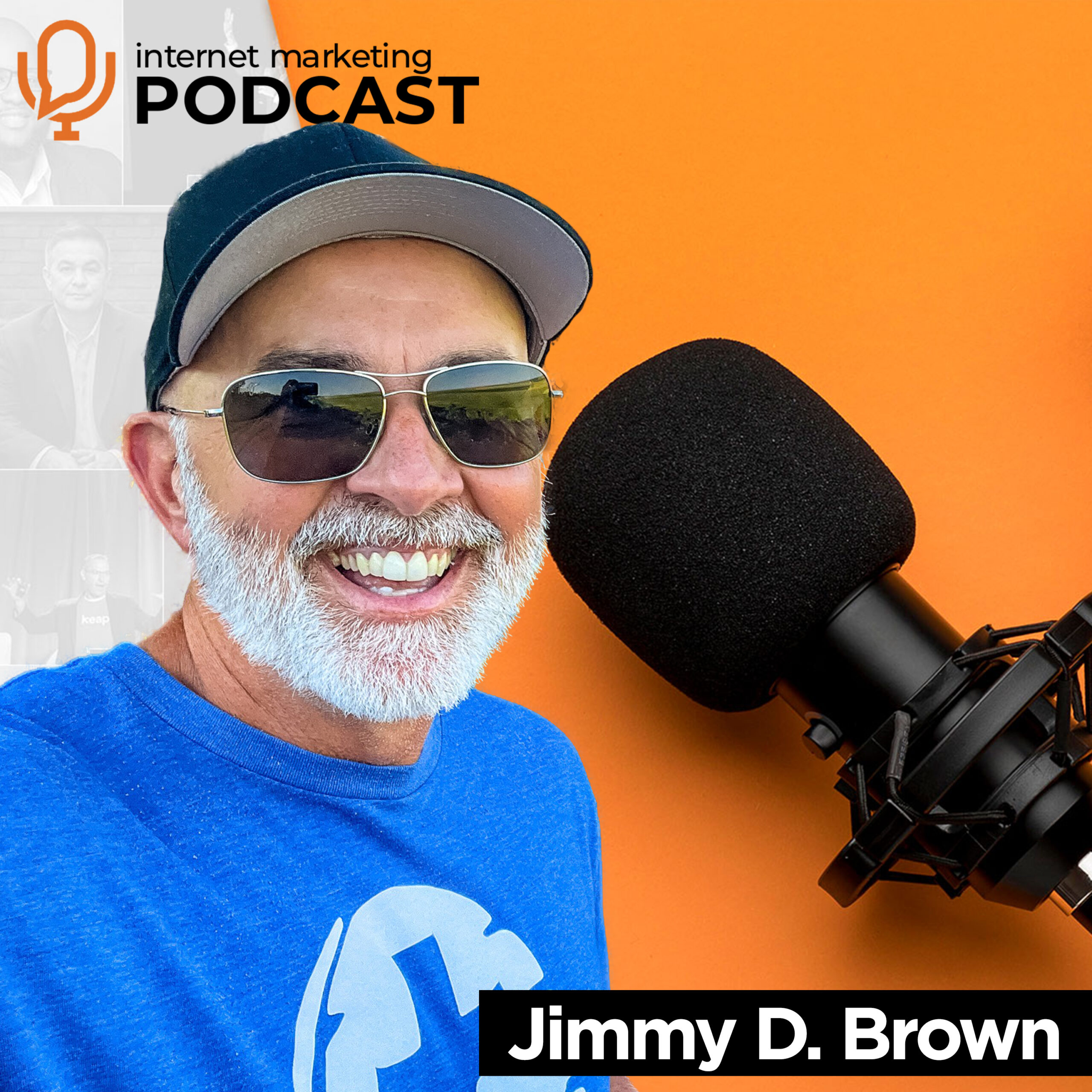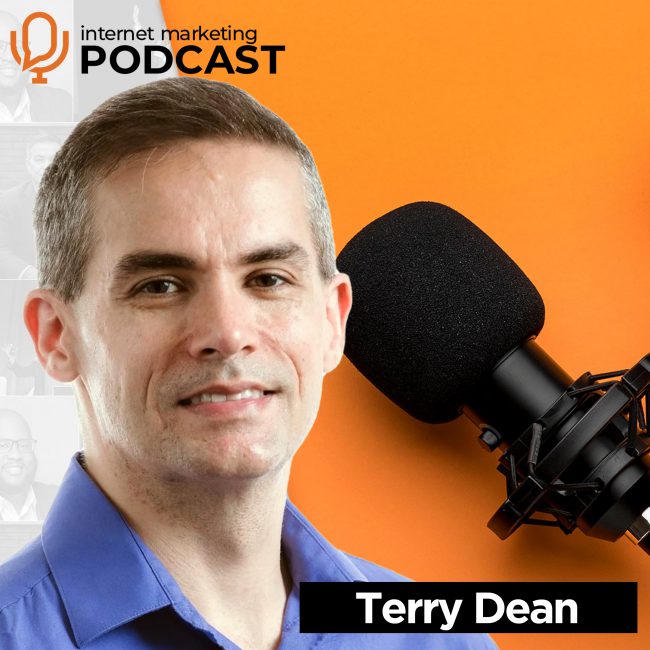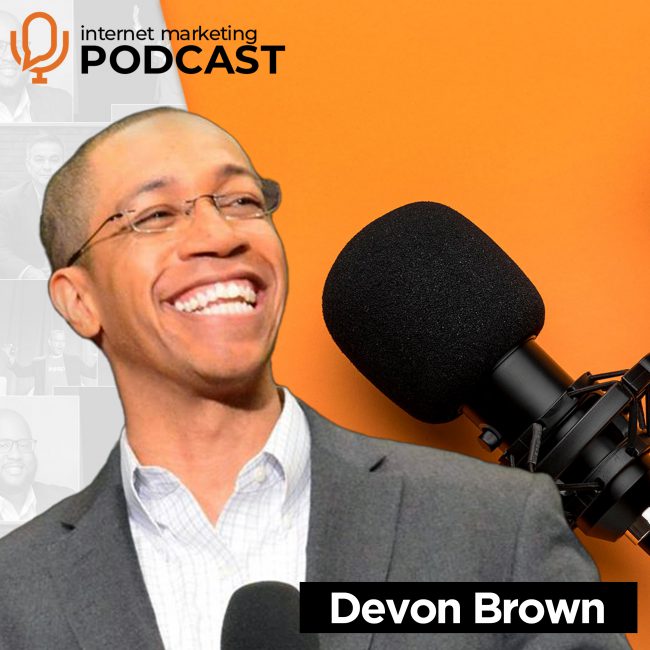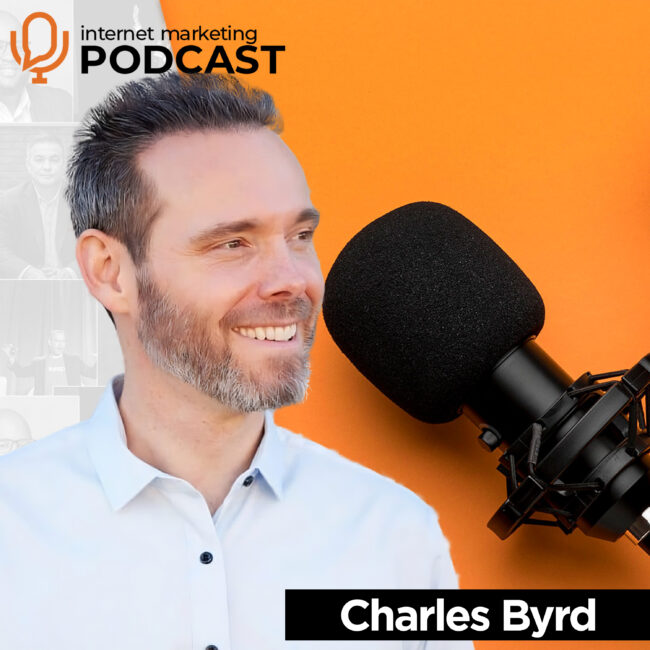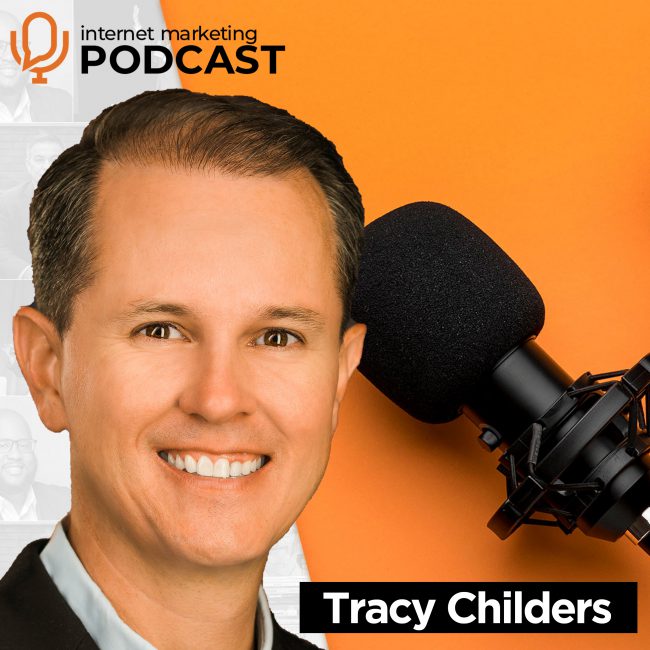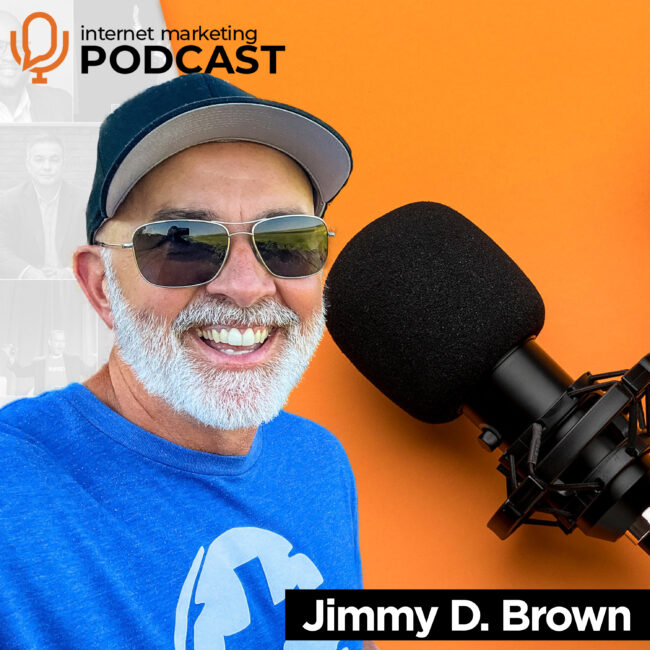
About this Podcast:
Today we are honoured to welcome Jimmy D Brown, a pioneer, an esteemed figure in internet marketing. Celebrating 24 years of remarkable innovation and quality, Jimmy is a revered advocate of the PLR or Private Label Rights movement. Known for his high quality products like Earncome and Nicheology. As he approaches his well-deserved retirement next year, Jimmy joins us for one of his very rare interviews, sharing the wisdom he’s accumulated over nearly a quarter of a century in the business.
Episode Transcript:
Today we are honoured to welcome Jimmy D Brown, a pioneer, an esteemed figure in internet marketing. Celebrating 24 years of remarkable innovation and quality, Jimmy is a revered advocate of the PLR or Private Label Rights movement. Known for his high quality products like Earncome and Nicheology. As he approaches his well-deserved retirement next year, Jimmy joins us for one of his very rare interviews, sharing the wisdom he's accumulated over nearly a quarter of a century in the business. Jimmy, welcome.
Jimmy D Brown:
Well, thanks very much for having me. Really, I'm the one who's honoured to be a part of your podcast here, so I really appreciate the invite.
Editor:
Oh, that's very nice of you to say, but thank you for joining us. Could we start by asking how you initially got involved in internet marketing and the creation of your products?
Jimmy D Brown:
So back in the late '90s, I first came online to buy some sports cards for a collectible shop that I owned, and I started getting these spam emails about making money online. So I looked at the offers that were being made and became intrigued, because I had always loved writing and the thought of creating a digital information product sounded appealing to me. I liked the idea of doing the work once and then you get paid over and over again, really with very little operating costs. So I began brainstorming ideas for what I might write about, and I stumbled upon a website called X.com, which was actually owned by Elon Musk, although no one really knew who he was back then. Well, this was an online bank and they gave new customers $25 to open up a free account with them. But the really interesting thing to me was, they would also give $25 for every customer that you referred to them who opened up a free account.
So I wrote this little ebook that I sold for $12.95, and the whole premise was to show people some ways to make money online, one of which could earn them $25 over and over again. Well, people would buy the $12.95 cent ebook from me, click through to X.com through my referral link to open their account, and then I'd earn $25 in commission. Over and over and over again this happened. It was awesome. I thought I was set up for life. But then X.com merged with another company and changed its name to PayPal. And PayPal decided they weren't going to do the $25 referrals anymore. So not only was I not going to be able to get those commissions, but I could also no longer sell my $12.95 cent ebook because it was no longer valid. I was basically out of business. But I saw the potential for selling information products to a global audience from the comfort of my home, and I quickly started creating new resources, and been continually doing so since August 2000, when I launched profitsvault.com.
Editor:
Well, legend has it that you are the person who invented PLR as a term or a concept. So tell me, how did that come about, and what drove you to invent the PLR licence?
Jimmy D Brown:
Toward the beginning of 2003, I started a monthly membership site called profitsvaultmonthly.com, where I created a new ebook every month, and members received master resale rights to it. This was uneditable, so they couldn't make any changes to it, but they were licenced to sell it and keep 100% of all the income that they generated. I'm a very prolific writer, but keeping up with a new ebook every month became a little bit of a challenge for me, and late in the year, I found myself struggling to make my monthly deadline. I had hired a ghost writer to create a few niche eBooks for me in markets that I was unfamiliar with, but I never did anything with those. So one month, I decided to release them to my Profits Vault monthly members instead of a regular ebook that I wrote. And I gave these to members in a fully editable document with a licence to edit them and use them as if they had wrote the content themselves.
And these products in the rough, which is what I called them, they were a huge hit. I mean, people loved them. So the next month, I did the same thing, and again, they were incredibly well received. Well, during that time, I was down in Austin, Texas, working on another project with Ryan Dice. At one time, we co-authored a number of products together and even formed an LLC together, and I told him that I was onto something here and we decided to open a monthly membership site with these editable niche products. We called it Nicheology. And as we were writing the sales letter, Ryan turned to me and said, "Well, what do we call these things?" And I said, "Well, I guess we should call them private label licences." And so we launched the first ever PLR membership site, and very quickly sold out 1,500 memberships at 29.97 per month, and PLR, as I envisioned it at least, started there and took on a life of its own after that.
Editor:
Well, over 24 years, I'm sure you've seen a lot of changes in the digital landscape. What are some of the pivotal moments for you in the early days?
Jimmy D Brown:
Well, one of the biggest things for me was making that first $12.95. And that's because I realised right then and there, this thing works. It wasn't much money, but it proved that my system worked. I knew that I just needed to scale things to make a lot of money while helping a lot of people. That's one of the lessons that I learned early on that served me really well, and that is this, rather than trying to be good at many things, be great at a few things. I'm a big believer in mastering one thing before starting to do a second thing. Make it work, make it work better, make it work as best as it can be, and then you make something else work. It's important to make something else work, of course, because I learned that lesson from x.com. You don't want to count on one thing as your only thing.
The old saying is, "Don't put all of your eggs in one basket," and that's true. So when you master something, it's important to diversify after that. When you have multiple streams of income, if one of them drives up, it won't ruin you while you find a way to replace it. Back in 2001, after the terrorist attacks on the United States, a lot of online sales really slowed in my industry because people weren't spending money on digital goods while they were wondering what was going to happen next. But I was okay because I had a monthly membership site. While my other products weren't selling as well, my monthly residual income was still coming in like clockwork. I was able to continue supporting my young family during some incredibly difficult times.
Editor:
Well, Jimmy, you've set a high standard of product quality in an industry that's often flooded with quick solutions. How important is maintaining quality for you and why?
Jimmy D Brown:
When I was just getting started, I purchased an information product that promised something like 20 ways to make money selling on eBay, and it was literally like this, "Make money on eBay by selling video games. Make money on eBay by selling jewelry. Make money on eBay by selling books. Make money on eBay by selling electronics," and so forth. There were 20 sentences in a list just like that, and that was it. No explanation of how to do it, no tips, no really help of any kind. It was just the same sentence with a different word at the end. I was incredibly disappointed and I really felt deceived by it. I promised myself that I'd never let any of my customers feel disappointed or deceived in what they purchased from me if I could help it. I feel like if someone is going to pay me for something, then I want to deliver something of value to them in exchange.
My goal isn't just to make money for myself, but also to make a difference in the lives of my customers. And so if I aim at both of those things, the result is going to be a quality product. And that's why I have people who have bought from me way back during those early days who are still active customers today. Basically, I try to live by the Golden rule in all areas of my life, including my business, and that is to treat others like I want to be treated. So when someone spends $97 with me, I don't want them to feel like they got $27 worth of value. I want them to feel like they got $497 worth of value. As an information seller, you want your name to be associated with quality and worth and results. Quick solutions and inferior products will make a sale, but they won't keep people coming back for more.
Editor:
So what do you think are some of the mistakes that people make when they're buying PLR products?
Jimmy D Brown:
Well, one of them is directly tied into what we just talked about and that is buying PLR products that are of low quality. Not all products are created equal. So many people mistakenly think value is low cost, or that it comes in bulk packages, and that's often not the case. Some content is not very well written. Some content contains erroneous information. Some content just isn't helpful to bring about a desired outcome, so buyers end up having to do massive rewrites or scrap the content altogether in order to make a product that they want to attach their own brand to. You surely don't want to sell crummy products to your own customers or they won't be customers for long. That's why it's so important that you vet your PLR providers. Identify those who have a reputation for quality. Pay more to get better stuff. Test out some samples before investing in bigger offers. Look for content that's ready to go as-is, right out of the box. It doesn't mean that you don't need to tweak it or personalise it, it just means it's so good that you don't have to.
So that's one thing. Another equally as big of a mistake is not using the PLR materials that you buy. I have a good friend of mine who probably has $50,000 worth of PLR sitting on his hard drive that's just gathering cyberdust. Now, why does that happen? I think there are two basic reasons. Number one, not having the willpower to say, "I don't need this right now." Yes, you may miss out on some special pricing or some limited quantity offers, but it doesn't do you any good to buy something that you never use. Number two is not having a plan for using what you have. I have always been a big believer in this, be an intentional shopper, not an impulsive buyer. Let me say that again, be an intentional shopper, not an impulsive buyer. So identify what your current needs are for PLR, and then go buy a specific piece that you can plug in and use immediately.
There are plenty of other mistakes such as not checking licencing terms to see what you can do and what you can't do with the PLR content that you buy, not editing the content to make it your own, not updating the content to make it current, or even evergreen, not understanding how many competitors you have and not doing anything to stand out from among those competitors, and not selling your own PLR content to other marketers and business owners.
Editor:
Could you maybe share some of the insights or strategies that have been particularly effective for you in creating high quality products?
Jimmy D Brown:
A couple of really important things for me has been to know my market and know myself. So first, I strive to know what my market wants and needs. I mean, these are the people that I'm here to serve, so how can I best help them? Think of it in terms of a map. Where are they at now, and where do they want to go? And I try to think about what I can do to help them make progress. Whether this is to help them solve a problem, reach a goal, or enjoy an interest, the aim is to facilitate movement. So often, it's really a process of helping them get unstuck somewhere along the way. But that only happens when I take the time to get to know them.
So I ask questions, I monitor my customer service tickets, I look in on social media discussions, I look at feedback that I receive, do research, I conduct surveys and so forth. It's fairly easy to help people when you know what kind of help they want and need. And then second, I have to know myself. That is, for the past 24 years, I've stuck to topics that I know a lot about and areas that I have a lot of experience in. I don't try to help people with things that I feel unqualified or inadequate to help with. For example, I don't sell products about SEO because I don't know much about it. I sell a lot of products about digital publishing and content creation because I know those subjects very, very well.
Over the years, I've tried to stay focused on the things that I personally know and do that work, which are duplicatable to other people. So knowing your audience and knowing yourself will really help you dial into the kinds of products you should create. If you stick to the things that you're gifted at and knowledgeable of and experienced in, that are important and helpful to the audience that you serve, then you're way more likely to be successful with them.
Editor:
Got you. Well, over the years, I'm sure there's many people that you've admired or perhaps looked up to along the way. Who are those people?
Jimmy D Brown:
Well, I've always hated this kind of question. In 24 years, there have been so many people that I've learned from and worked with, and I'm always going to forget somebody important. So I usually just dodge this kind of question. So rather than try to share a bunch of names, let me answer this in a couple of ways. First, there were a couple of people who were instrumental in getting me started way back in the year 2000 when I was a complete unknown. I contacted everyone who had a platform in the internet marketing space back then, and most of them ignored me, because nobody knew who I was. But Phil Wiley and Frank Guerin took the time to look at my offer and were impressed with it. They both promoted me to their list, and those early subscribers who came from them became customers who became affiliates, and it snowballed into a six-figure income my first full year in the business. So I am forever indebted to these two guys for helping me to get started.
Second, I have to mention Ryan Deiss, because he and I formed a partnership and started something incredibly special with Nicheology and the PLR industry and all that stuff that came after. Ryan was barely out of college, such a young guy, but so incredibly smart. He was always smarter than I was. And he was motivated and he was very likeable. He would come to our house to stay, work and play, and I would go to his house to stay, work and play. And he and his wife, Emily, would vacation with my wife, Paula, and our son, Jacob. And a lot of what we did together in those days took my business from a six-figure income to making multiple millions of dollars. And it's been a real joy to see him just rise to really stratospheric levels with his business as a worldwide leader in digital marketing. So, so happy for him and Emily and their family,
But working with him was a very important part of my story. It still pays dividends today, and I very much look up to him, even though he still looks like a kid to me. I mean seriously, does he ever even age? As for the others, all usual people would be on my list. I've learned something from just about all of them. Some were more influential than others, but I've got a long, long list of contributors to my success.
Editor:
Jimmy, what tips or tricks have you learned in your career that you think could benefit other people who are maybe just starting out?
Jimmy D Brown:
Have the right expectations going in. It's going to take some work, it's going to take some time. If someone tells you it's quick and easy, you probably shouldn't let them be a voice in your life when it comes to your business. While there are rare occasions of overnight success, for most people, that just isn't going to happen, no matter how talented you are or motivated you are or resourceful you are. So be in this for the long haul and not some quick strike. If you're just starting out, set some reasonable, reachable income goals. I mean, set a plan with actionable steps toward those goals, and a timeline for accomplishing those goals. Set a daily, weekly, and monthly schedule with time set aside for taking those steps. I mean, you really can do it, but you're going to have to do it. Are you tracking with that?
It just isn't something that's going to happen, you're going to have to make it happen by being smart and intentional and disciplined and enduring, until you get there. Now, you live at a time that is incredibly competitive, because others have been doing it for a while now, no matter what niche you're in, but you're also living when opportunity is at an all-time high with the technology and global audience and done-for-you content and proven processes that are all in place for you in ways that those who came before you didn't have. So take advantage of all those things one piece at a time.
I guess to sum it up, for those who are just starting out, I would say this, remember you're just starting out. You don't get off the couch and run a marathon the next day. You don't apply for a job at McDonald's and run the corporation the next day, but every day you make it a little further and a little higher than the day before. Make progress and persevere.
Editor:
Right. Well, if you could give maybe just one piece of advice to your younger self, knowing what you know now and reflecting on your successful career, what would that be?
Jimmy D Brown:
It would probably be this, spend more time building joint venture relationships. Back in my early days, back when Phil and Frank got me started, I used ClickBank and affiliates really drove my business. I invested heavily in finding new partners and equipping them with these easy-to-use tools and training, it really was the lifeblood of my business. I participated in quite a few partnerships and all were really, really lucrative for me. I had a really good affiliate manager, Nicole Dean, who got a lot of people on board and really did an excellent job of managing my affiliate programme for me. And then for reasons that I really don't even remember now, when my business got to about $50,000 per month, I just stopped investing in all that.
A lot of it probably had to do with the season of life that I was in, I spent a lot of time with Jacob and Paula travelling. Then we spent 10 years in pastoral ministry where I wasn't doing much with my business, and other people came along and those affiliates and partners started working elsewhere. And a lot of those affiliates became really successful with their own products, which I was really happy to see. But instead of recruiting new affiliates to replace them, I just did my own thing. I never did big product launches, never did affiliate contests, never really did much of anything the past decade to get other people involved like I used to, and be involved in their businesses like I used to.
And I do regret that a bit, I do. Not just because it would've meant more money for all of us, and more people who could have benefited from our products, but because I've had some really good friendships over the years that I would've liked to see blossomed into great friendships. So really probably, if I had a do-over, I'd be a bit more intentional about working together with others.
Editor:
I think it's safe to say that your products like Earncome and Nicheology have helped countless marketers. So what goes into developing those products, and how do you ensure that they continue to stand out?
Jimmy D Brown:
Well, I think a lot of it goes back to what we talked about earlier in terms of making it a quality product that I know a lot about, that I know works, which the people I serve want or need, that they would find useful in helping them achieve the outcome that they're after. Then there is the originality piece where I try to say things differently than other people are saying it or come at a topic from a unique angle that maybe other people aren't really focusing on at the moment. While I tend to focus more on Evergreen content because of its staying power, it doesn't become outdated or need to be updated, I am also not afraid to seize an opportunity when it comes by. So many years ago, right around the time the CAN-SPAM Act was passed, email delivery was a big concern and open rates plummeted for a lot of people.
So I quickly wrote a course called Get Messages Read. I mean, no creativity at all there, just the ultimate benefit right there in the title. It had 24 ways to get your emails delivered and read, and it was a huge hit for me and I had a tonne of affiliates promoting it. And again, even though I tend to stick to things that are proven to work for me, I'm not afraid to try new things. That's where my PLR came from. That's where Mebernaire came from, when I came up with the term fixed-term membership, which is still floating around today.
While everyone was doing open-ended memberships, I started a membership site that was 52 lessons long, delivered through email over a year-long period, and I sold it for $27 a month. And I sold out the 1,000 memberships that I made available because of the premise of my membership, and that was that you could start your own fixed-term membership in just 24 hours. And it didn't require a lot of stockpiling content like traditional memberships did. So I guess being both set in my ways and doing things that are tried and true, proven to work over and over again, with the occasional trying something new and innovative, has been a good blend for me.
Editor:
Can I just ask, as you approach retirement, what are some of the lessons that you've learned about balancing work and also your personal life?
Jimmy D Brown:
While I have placed a very high premium on really helping the audience of people that I've served in my business, and I've taken that responsibility very seriously, I also saw my business on a personal level as a means to an end for me. In other words, I've been very intentional about making money, not so I could be wealthy or well-known or an influencer as my main goal, but so that I could spend the bulk of my time doing what matters most to me, namely to serve Jesus, spend time with my wife and son, do good in this world offline, and enjoy life each day. And so for most of the past decade plus, I've spent less than three hours a day, Monday through Friday, working on my business, and the rest of the time on my bigger priorities.
So my takeaway from all of this is to not lose sight of your why. Why do you want to run an online business? Why do you want to make money? And in as much as it's possible, do that now. Maybe the amount of time and money you spend on that isn't as much as you'd like to or you will be able to later. Don't let life pass you by while you're trying to get to that level. Work can be incredibly rewarding in many, many ways of measuring it, but the greatest measurement and the greatest reward is that you're living your life in the way that it's meant to be lived, with the people and priorities that are most important to you. I've jokingly said that I've been living semi-retired since August 2000, but it's kind of true.
Editor:
Okay. And looking back, what do you consider to be your greatest achievement, or perhaps even the highlight of your career?
Jimmy D Brown:
Well, strictly from a career or business perspective, it's seeing people who didn't know what they were doing when they came to me, who are now making a lot of money and making a difference in the lives of other people in their own businesses, because I was able to teach them something helpful. Getting an email from someone who tells me what a particular course or resource was able to do for their business and their life, when someone sends in a genuine unsolicited testimony, when someone buys a product from me without even reading the sales letter, because they've seen value in what they bought before from me, that's the real highlight for me, changed lives. I really believe that I'm meant to be a difference maker in business and in life as a whole, and so to see that come about, see God working through me in different ways like that, that that really is the highlight, or the most important thing that I would point to when it comes to the things I've done in my business these last 24 years.
Editor:
Mm-hmm. Okay. And what advice would you perhaps give to someone who's looking to get started today?
Jimmy D Brown:
I'd probably say get a coach or a mentor to help you, especially in those areas of weaknesses or areas where you get stuck. Let me share a non-business story to maybe illustrate the point. As of right now, I've run 106 full marathons or ultra marathons, including six different 100 mile races. When I first started running 5Ks, I figured things out on my own. But when I started training for my first marathon, which is 26.2 miles, I really, really struggled. Why? I didn't know. I mean, I bought a book, I looked at an online plan, I just couldn't do it. And I called my wife one day from a Walmart parking lot while I'd been out on a run and I said, "Come get me. I'm quitting, and I'm never running a marathon."
Well, in time, I found a coach and a nutritionist, and a physical therapist and a masseuse, and they told me all the things I hadn't been told in the books. They made it personal for me. They showed me how to take the information that I found in those other resources and apply it to my specific life and situation. And here I am, 20,000 miles later, still happily running. So what's the point? Information will only take you so far. Having someone else in your life who has already succeeded in what you want to do will take you the rest of the way. Why? Because he or she or they can help you see how the information is to be used in your specific business and schedule and season of life and background and market and goals and so forth. So what I would tell myself, and I would tell all of those listening, whether they're just starting out or they want to get to the next level, is this, find someone who is farther along in the journey that you're on, and get them to show you the way. Get a coach.
Editor:
Mm-hmm. Now, as I mentioned earlier, you are looking to retire next year, so what are you most looking forward to doing that you haven't been able to do so far?
Jimmy D Brown:
Honestly, there's nothing new that I'll be doing that I haven't been doing all along. Like I mentioned before, I've been very purposeful about doing the things I want to do all along the way, and that's been a real blessing that I'm truly thankful for. Having the freedom and flexibility to set my own schedule and work when and where I want has been incredible. So really, I'll be doing more of the same in terms of non-business stuff, serving in the church, spending time with family and friends, helping others in whatever way that I can, the same kinds of things that I've been doing.
There is one new thing that I'll be focusing on. As I close out my content business, I'm going to start doing more business and life coaching. I've offered it in little bits here and there in the past, but I'm really going to do a lot more of it moving forward. It's going to be very personal, very one-on-one coaching, that's faith-based and comes from a Christian, biblical perspective on how to be successful in business and in life. So I'm really excited about this because while I'll be able to work with less people than I would sell products to, the work will be very personal. So I'm looking forward to helping people get unstuck, like I mentioned earlier, and helping them get from where they are to where they want to be in areas like business, relationships, running, ministry, and so forth.
Editor:
Well, I know we're running out of time, so finally, for those who are interested in following your footsteps or maybe learning from your resources, where can we find more information about you and your work, Jimmy?
Jimmy D Brown:
My business website is earncome.com, where you'll find a couple dozen courses and resources that are currently available, both with and without PLR licencing. And then my ministry website is jimmybrown.com, where there are a number of free resources to help you in your spiritual journey, such as daily devotions and eBooks. This is also where I'll be offering my coaching sometime in 2025.
Editor:
Oh, that's brilliant. Thank you so much for joining us. It's been an absolute pleasure.
Jimmy D Brown:
Well, thanks for having me on today. It's been a pleasure to share with you guys, and I hope your listeners find it helpful in some way for their own businesses and their lives. Again, appreciate you guys inviting me.
